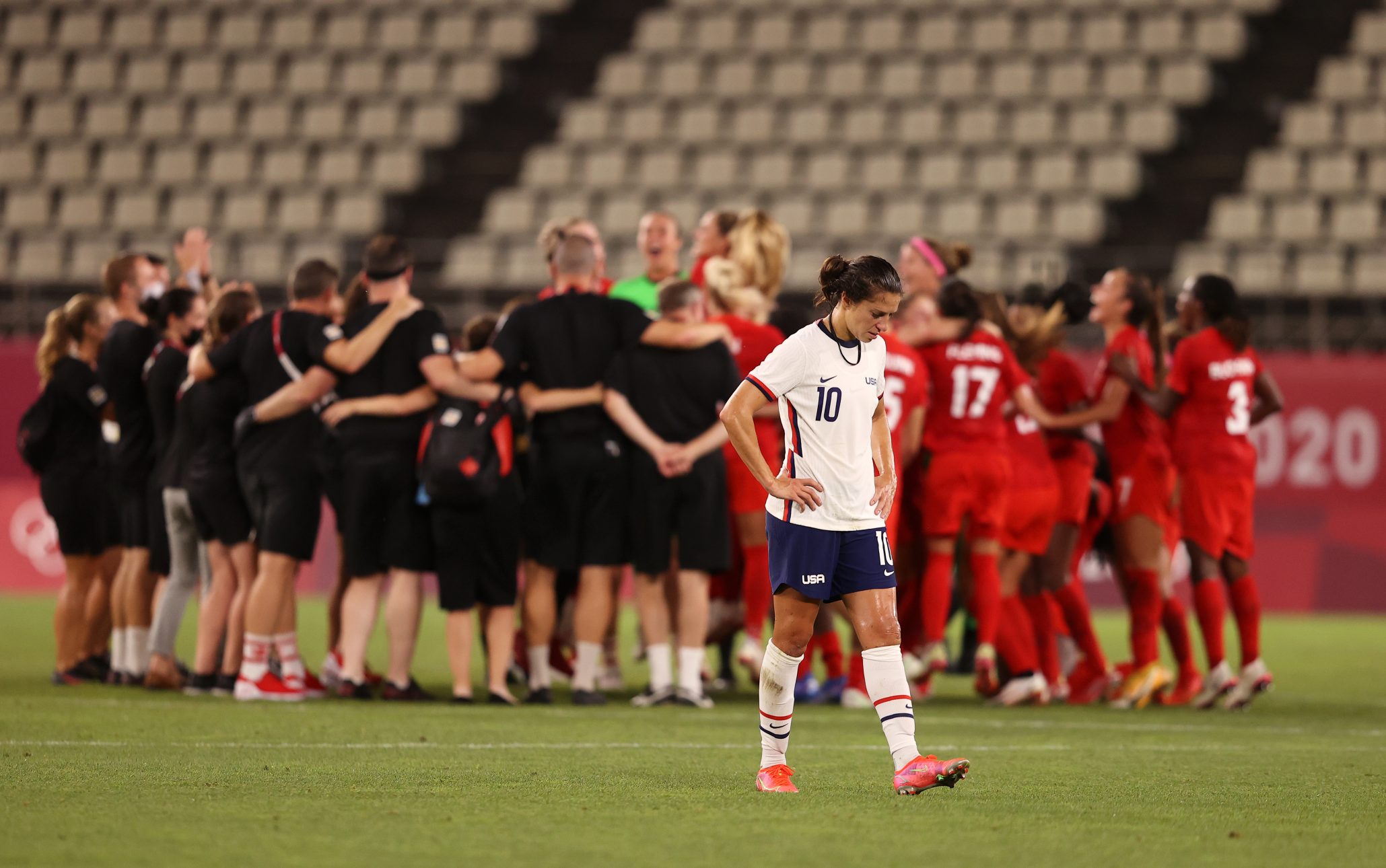The Canadian women's national soccer team would find no reasons to whine about the officiating after this particular Olympic semifinal. In their eyes, what happened on Monday evening in Kashima was probably a dose of karma for the USWNT, for when the Americans took advantage of questionable calls to win in this round in 2012. But however you want to look at the events that led to Canada's 1–0 win, a couple of things are indisputable: the Canadians just got the most important soccer win in their country's history, while the underachieving U.S. side has tasted bitter disappointment for the second straight Olympics.
At a glance, all the numbers from this match favor the USWNT. While Canadian veteran Desiree Scott talked up the way her team had developed as an attacking threat since the last time they squared off against the U.S. in a major competition, the truth is that the Canada of 2012, with Christine Sinclair in her prime, was a much more dangerous threat around goal than this group that's dragged itself to the final. In this game, the U.S. held possession 56 percent of the time. They took 17 shots to Canada's 5. And they forced the Canuck goalkeeper Stephanie Labbé to make six saves, while the Americans only stopped one shot, and not until the 84th minute.
But that one goal for Canada is all that matters, and it came after the VAR alerted the referee of a possible penalty on the very edge of the box as both the U.S.'s Tierna Davidson and Canada's Deanne Rose chased down a fairly innocuous ball in the 72nd minute. What was originally called a goal kick instead, suddenly, turned into a video review, where Ukrainian referee Kateryna Monzul ruled that Davidson had illegally kicked Rose's foot just inside the area where you can least afford to do that. The decision is a hard one to argue with, but given how accidental it was and how far away from a true goal-scoring opportunity it was, it's still an immensely frustrating way to go to the bronze medal game.
🤨 ¿HABÍA PENAL?
— Telemundo Deportes (@TelemundoSports) August 2, 2021
🖥 El VAR entró en acción para checar si hubo o no contacto de @roselavelle
😱 La árbitro marcó penal para @CanadaSoccerEN #OlimpicosTelemundo pic.twitter.com/BFFuMYY1q3
It briefly looked as though Sinclair would take the kick herself and have her revenge on the United States, nine years after claiming that "the ref decided the result before it started” in the Olympic semis between these two. But instead, the world's all-time leading international goal scorer handed the ball off to Jessie Fleming, who perfectly placed a no-doubter to the far left of Adrianna Franch.
🚨 ¡CANADÁ SUEÑA CON LA FINAL!
— Telemundo Deportes (@TelemundoSports) August 2, 2021
🇨🇦 Jessie Fleming definió de manera magistral el disparo desde los once pasos
🤩 Está siendo la heroína de @CanadaSoccerEN
😰 ¿Reaccionará @USWNT? #OlimpicosTelemundo #USA 0-1 #CAN pic.twitter.com/TmDUfnyRns
"I can hardly remember a time when the Canadians were even in the final third until that moment in the second half," NBC announcer Arlo White observed after the goal was scored.
The USWNT, in response, didn't exactly surrender—Carli Lloyd, for one, hit the crossbar with a header in the 86th minute. But all throughout the game, they were unable to manufacture any real heart-in-mouth scoring chances. They simply lacked a spark, as they have this whole tournament, and they finally hit a point where their inherent talent advantage could not overcome their age and exhaustion.
The 2012 instant classic between these two teams, as memorable as it was, didn't do much to alter the dynamic between the U.S. and Canada. The USWNT continued to dominate after that win, taking a gold medal and two World Cups, while the Canadians, despite their bronze medals, kept failing to beat the U.S. again and again even after coming so close in London. This game, on the other hand, feels like a turning point. Even though they'll be clear underdogs against Sweden, Canada has guaranteed itself its best major tournament finish ever with its first win against the USWNT since 2001. The U.S., meanwhile, went into the Olympics trying to win one last accolade for an amazing generation of players, and after running up against the limits of their experience, the moment is right to transition to a new cohort ahead of the 2023 World Cup. The next time these two meet, the American roster should look significantly different. Perhaps just as importantly, they'll have something to avenge. I guess now it's a real rivalry.






